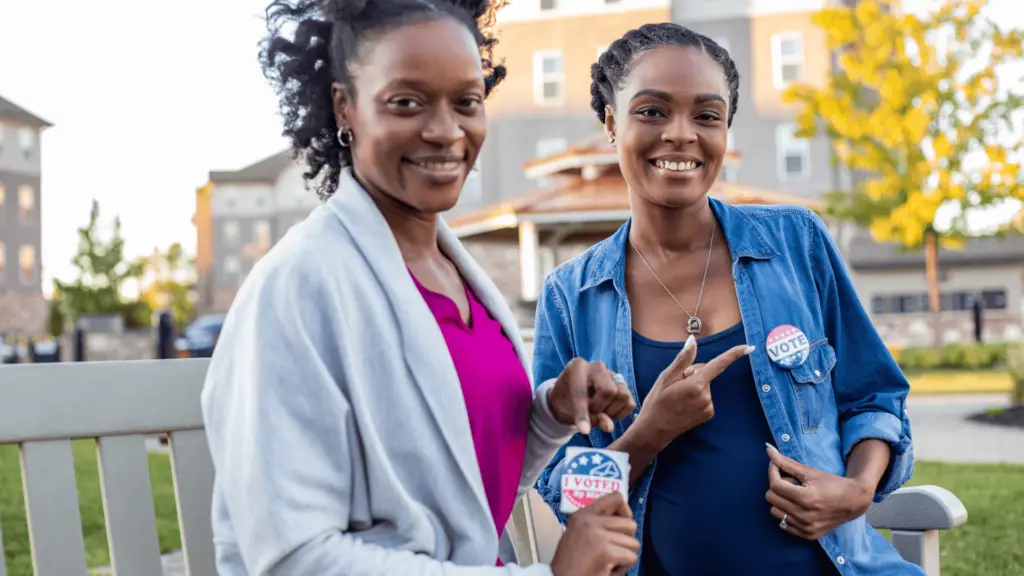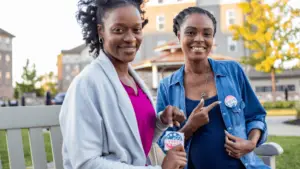Protecting Democracy and Advancing Black Empowerment
The 2024 Election
This upcoming election could reshape America in ways that will impact generations. The survival of democracy and civil rights is at stake. Trump, MAGA, and the GOP are pushing Project 2025, a plan that would drastically alter our nation. Their track record shows a clear anti-Black stance, evident in policies that harm the African American community.
Despite this, some Blacks may sit out the election or vote for Trump, thinking it will punish the Democrats. This is a dangerous tactic. Not voting or voting for Trump only strengthens MAGA’s ability to claim political power. The lesson won’t fall on Democrats—it will backfire on our communities.
"My greatest fear is that one day we may wake up and our democracy is gone." — John Lewis, Good Trouble
John Lewis
History Of Voting In America
Voting is the foundation of our democracy. By voting, we can choose our leaders, from the President to local officials like school board members. Voting also lets us shape the laws that affect our lives. But for much of our history, not everyone had this right. Black people and women were excluded.
Black Americans have been essential in the fight for voting rights. In the 1700s, each state set its own voting rules, often allowing only white landowners to vote again. But by the 1800s, most white men could vote even if they didn’t own property. It wasn’t until 1870, with the 15th Amendment, that Black men gained the right to vote. Yet, many states used unfair literacy tests and poll taxes to make it difficult for Black people to vote.
In 1920, fifty years later, the 19th Amendment finally gave women the right to vote. Then, in 1964, the 24th Amendment banned poll taxes, which had been used to keep Black Americans from voting. These taxes were a tactic to limit Black voting power, mainly in states like Virginia, Alabama, Mississippi, Arkansas, and Texas. These restrictions were part of “Jim Crow” laws aimed at separating and oppressing Black citizens.
The Voting Rights Act of 1975
After a long struggle, Congress enacted the Voting Rights Act of 1965, which made it unconstitutional for certain states to implement changes to their voting rights laws without preclearance from a federal judge or DOJ.
Unfortunately, in the Shelby County v. Holder case, after the country elected and re-elected its first Black President, the Supreme Court (SCOTUS) invalidated critical provisions of the VRA. Congress has attempted to correct the VRA with the John Lewis Voting Rights Advancement Act. But the GOP blocks this attempt. We see the results of the Shelby County case in more restrictive voter ID laws, gerrymandering, and other tactics that often make it harder for Blacks to vote. We must continue pushing Congress to enact the Bill for Voting Rights.
Why Voting Matters
Voting isn’t just a right; it’s power. Politicians work for the people who elect them. When Black Americans unite and vote, we can push for laws that support our communities, such as the John Lewis Voting Rights Advancement Act or the John Lewis Justice In Policing Act. Our votes shape policies on jobs, schools, healthcare, and more—issues that affect our everyday lives.
How We Can Strengthen Our Votes
Here are a few ways to build and protect our voting power:
- Conduct events to educate our community about voting and the candidates.
- Partner with other marginalized groups can amplify our voices.
- Register voters and providing rides to the polls can help increase turnout.
- Advocate for laws that protect voting rights.
- Track what our leaders are doing and make sure they represent our needs.
When we unite and use our vote, we strengthen our voice. But if we don’t organize, strategize, and focus on voting for empowerment, we give away our power. Voting is a right—and it’s also our responsibility. Remember to go vote on November 5, 2024.






